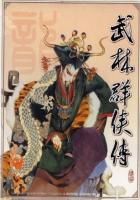The Aino of Saghalien rear bear cubs and kill them with similar ceremonies. We are told that they do not look upon the bear as a god but only as a messenger whom they despatch with various commissions to the god of the forest. The animal is kept for about two years in a cage, and then killed at a festival, which always takes place in winter and at night. The day before the sacrifice is devoted to lamentation, old women relieving each other in the duty of weeping and groaning in front of the bear's cage. Then about the middle of the night or very early in the morning an orator makes a long speech to the beast, reminding him how they have taken care of him, and fed him well, and bathed him in the river, and made him warm and comfortable. Now, he proceeds, we are holding a great festival in your honour. Be not afraid. We will not hurt you. We will only kill you and send you to the god of the forest who loves you. We are about to offer you a good dinner, the best you have ever eaten among us, and we will all weep for you together. The Aino who will kill you is the best shot among us. There he is, he weeps and asks your forgiveness; you will feel almost nothing, it will be done so quickly. We cannot feed you always, as you will understand. We have done enough for you; it is now your turn to sacrifice yourself for us. You will ask God to send us, for the winter, plenty of otters and sables, and for the summer, seals and fish in abundance. Do not forget our messages, we love you much, and our children will never forget you. When the bear has partaken of his last meal amid the general emotion of the spectators, the old women weeping afresh and the men uttering stifled cries, he is strapped, not without difficulty and danger, and being let out of the cage is led on leash or dragged, according to the state of his temper, thrice round his cage, then round his master's house, and lastly round the house of the orator. Thereupon he is tied up to a tree, which is decked with sacred whittled sticks (inao) of the usual sort; and the orator again addresses him in a long harangue, which sometimes lasts till the day is beginning to break. Remember, he cries, remember! I remind you of your whole life and of the services we have rendered you. It is now for you to do your duty. Do not forget what I have asked of you. You will tell the gods to give us riches, that our hunters may return from the forest laden with rare furs and animals good to eat; that our fishers may find troops of seals on the shore and in the sea, and that their nets may crack under the weight of the fish. We have no hope but in you. The evil spirits laugh at us, and too often they are unfavourable and malignant to us, but they will bow before you.
We have given you food and joy and health; now we kill you in order that you may in return send riches to us and to our children. To this discourse the bear, more and more surly and agitated, listens without conviction; round and round the tree he paces and howls lamentably, till, just as the first beams of the rising sun light up the scene, an archer speeds an arrow to his heart. No sooner has he done so, than the marksman throws away his bow and flings himself on the ground, and the old men and women do the same, weeping and sobbing. Then they offer the dead beast a repast of rice and wild potatoes, and having spoken to him in terms of pity and thanked him for what he has done and suffered, they cut off his head and paws and keep them as sacred things. A banquet on the flesh and blood of the bear follows. Women were formerly excluded from it, but now they share with the men. The blood is drunk warm by all present; the flesh is boiled, custom forbids it to be roasted. And as the relics of the bear may not enter the house by the door, and Aino houses in Saghalien have no windows, a man gets up on the roof and lets the flesh, the head, and the skin down through the smoke-hole. Rice and wild potatoes are then offered to the head, and a pipe, tobacco, and matches are considerately placed beside it. Custom requires that the guests should eat up the whole animal before they depart; the use of salt and pepper at the meal is forbidden; and no morsel of the flesh may be given to the dogs. When the banquet is over, the head is carried away into the depth of the forest and deposited on a heap of bears' skulls, the bleached and mouldering relics of similar festivals in the past.
The Gilyaks, a Tunguzian people of Eastern Siberia, hold a bear-festival of the same sort once a year in January. The bear is the object of the most refined solicitude of an entire village and plays the chief part in their religious ceremonies. An old she-bear is shot and her cub is reared, but not suckled, in the village. When the bear is big enough he is taken from his cage and dragged through the village. But first they lead him to the bank of the river, for this is believed to ensure abundance of fish to each family. He is then taken into every house in the village, where fish, brandy, and so forth are offered to him. Some people prostrate themselves before the beast. His entrance into a house is supposed to bring a blessing; and if he snuffs at the food offered to him, this also is a blessing. Nevertheless they tease and worry, poke and tickle the animal continually, so that he is surly and snappish. After being thus taken to every house, he is tied to a peg and shot dead with arrows. His head is then cut off, decked with shavings, and placed on the table where the feast is set out. Here they beg pardon of the beast and worship him. Then his flesh is roasted and eaten in special vessels of wood finely carved. They do not eat the flesh raw nor drink the blood, as the Aino do. The brain and entrails are eaten last; and the skull, still decked with shavings, is placed on a tree near the house. Then the people sing and both sexes dance in ranks, as bears.
One of these bear-festivals was witnessed by the Russian traveller L. von Schrenck and his companions at the Gilyak village of Tebach in January 1856.















